Local
Freedom to Marry spurns Md. marriage campaign
Nat’l group uncertain local supporters can defeat referendum

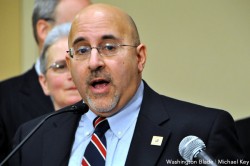
Evan Wolfson says that a Maryland marriage bill would be vulnerable to a voter referendum. (Washington Blade photo by Michael Key)
Evan Wolfson, executive director of Freedom to Marry, told the Washington Blade on Monday that his group chose not to join a coalition of local, state and national groups called Marylanders for Marriage Equality. The coalition is leading efforts to lobby the Maryland Legislature to approve a same-sex marriage bill when it convenes in Annapolis in January.
“We are deeply committed, as we have been for years, to ending exclusion from marriage in Maryland and throughout the country,” Wolfson told the Blade in an email.
But he added, “In Maryland, because of the likelihood that marriage legislation can be forced onto the ballot, the key question is not just passing a bill in the legislature, but defending it against an attack campaign via ballot measure,” he said.
“Freedom to Marry has made it clear to members of the coalition and to lawmakers that our goal is to win, not simply to pass a bill, if there is not sufficient groundwork and investment in a campaign to win at the ballot,” he said.
“We have continued to press for clarity and progress on benchmarks for success, and have urged elected officials, national organizations, and advocates on the ground to show the plan, investment, and activities needed now to build public support and succeed at the ballot, not just the legislature,” he told the Blade in his email message about the Maryland marriage campaign.
Spokespersons for two of the lead coalition partners of Marylanders for Marriage Equality – Fred Sainz of the Human Rights Campaign and Lisa Polyak of Equality Maryland – responded cautiously to Wolfson’s comments, saying the coalition is actively engaged in laying the groundwork and mapping strategy for fighting a possible marriage referendum.
Other sources familiar with the coalition’s member groups, who spoke on condition that they not be identified, said at least some of the coalition’s representatives took offense at Wolfson’s remarks. They said he appeared to be drawing conclusions about the coalition’s capabilities and setting criteria for it to obtain help from Freedom to Marry without knowing the full details of the coalition’s activities since it formed in July.
In addition to HRC and Equality Maryland, other members of Marylanders for Marriage Equality include the NAACP of Baltimore, the ACLU of Maryland, the Service Employees International Union of Maryland, the National Gay and Lesbian Task Force, Progressive Maryland, the National Black Justice Coalition, Catholics for Equality, Maryland Faith for Equality, Maryland NOW, the Family Equality Council, and Parents and Friends of Lesbians and Gays (PFLAG).
“With the help of all of our coalition partners we believe that both a legislative fight as well as a referendum is very winnable in Maryland,” said HRC spokesperson Fred Sainz. “In fact, our recent polling shows that 51 percent of Marylanders would support it,” he said in referring to the same-sex marriage bill.
Another HRC spokesperson, Kevin Nix, released to the Blade the results of a poll that HRC commissioned from the polling firm Garin Hart Yang, which shows 51 percent of those polled would vote in support of same-sex marriage in a possible Maryland referendum. The poll showed 44 percent would vote against same-sex marriage in such a referendum, while 5 percent were undecided or had no opinion.
Nix said the poll was conducted Oct. 20-23 of this year.
“We believe that the numbers will continue to grow and the enthusiasm for marriage equality will only become greater should there be the need for a referendum,” Sainz said.
Lisa Polyak, board chair for Equality Maryland, acknowledged that the makeup of the Maryland Legislature will be the same in January as it was in March of this year, when it failed to pass a same-sex marriage bill due to lack of support in the House of Delegates. The State Senate passed the measure in what observers called an historic development.
But Polyak said the difference going forward is that Maryland Gov. Martin O’Malley, a Democrat, has agreed to introduce the bill this time around and serve as its chief sponsor in the legislature’s 2012 session, providing an important boost for its chances of passing.
“At Equality Maryland, we’re following the governor’s lead and we intend to show that his confidence and the ability of Maryland to pass this legislation are well founded,” she said. “We are going to work and work and work to not just pass the bill through the legislature but to deal with anything that comes after it to make sure that we achieve the goal of legal equality for our families through civil marriage.”
Asked if she believes the coalition is prepared to fight a ballot referendum, Polyak said, “Yes, we feel that we are and will be prepared if that becomes a reality.”
Maryland State Sen. Rich Madaleno (D-Montgomery County), who’s gay, said he, too, believes the coalition is quickly building an infrastructure needed to fend off a referendum. However, he said a referendum is not an absolute certainty. Under Maryland’s referendum law, organizers of a referendum must obtain about 52,000 petition signatures in a period of less than three months.
In past referendum battles, those opposing a referendum have challenged the validity of many of the signatures in efforts that have sometimes succeeded in preventing a referendum from reaching the ballot.
Melissa Goemann, legislative director of the ACLU of Maryland, said her organization and the coalition as a whole are “definitely” working on a plan to deal with a referendum over the marriage bill. She said ACLU of Maryland has hired a field director to work full-time on the marriage bill.
“We are very enthusiastic,” she said.
Others familiar with the Maryland coalition acknowledge that fighting a voter referendum will be a daunting task if recent history is a predictor of the outcome. Since 2004, opponents of same-sex marriage have succeeded in persuading voters in 29 states to approve ballot measures banning same-sex marriage in those states’ constitutions.
In 2006, same-sex marriage supporters in Arizona succeeded in defeating a ballot measure seeking to put in place a draconian constitutional amendment that would have banned same-sex marriage in the state as well as civil unions and domestic partnership rights for same-sex couples. The defeat marked the first and only time a state ballot measure calling for banning same-sex marriage had been beaten back.
But a short time later, Arizona voters passed a less restrictive ballot measure that bans same-sex marriage while allowing civil unions or domestic partnerships.
The National Organization for Marriage, the group leading efforts to oppose same-sex marriage in the United States, boasts that opponents of same-sex marriage have a perfect record of 29-0 in the fight against same-sex marriage.
Despite these odds, marriage equality advocates, including Wolfson, have said in the recent past that efforts to pass same-sex marriage bills in state legislatures or through the courts should continue. In discussing the approval in 2008 by California voters of Proposition 8, which overturned that state’s same-sex marriage law, Wolfson said the debate over Prop 8 played an important role in educating the American public about the importance of marriage equality.
Although Prop 8 was a defeat for LGBT equality in the short term, Wolfson has said it opened the way for “conversations” about marriage equality among the American people that would lead to the changing of hearts and minds of the public in the near future.
Some of the participants of Marylanders for Marriage Equality, speaking on condition that they not be identified, said the same principles should apply to Maryland. They said Wolfson should not impose a “benchmark” on the Maryland effort that calls for a guarantee that a referendum will be defeated before Freedom to Marry or other national organizations will lend their support.
Wolfson responded to these concerns in a follow-up email on Tuesday reiterating his belief that some benefit can be achieved even if a state marriage referendum loses. But he said such a benefit can only come about if supporters of marriage equality wage an effective and well thought-out campaign.
“[W]hen we engage in these campaigns against ballot attacks, we should fight so as to at least ‘lose forward,’ i.e., gain ground and set the stage for the next fight, via public education and enlisting support, even if we can’t prevail on the enemy’s timeframe by election day,” he said.
“So it is true that I believe in the value, indeed the necessity, of persuasion,” he added, which he described as lesson number two. “Lesson 1 was win,” he said.
“In Maryland, we have the opportunity to actually win and hold marriage, if we do what is needed not just to advance a bill but to mount a sustained and sufficient campaign to defend marriage at the ballot,” Wolfson said. “Benchmarks for achieving and holding the win are what Freedom to Marry has called for.”
Virginia
From the Pentagon to politics, Bree Fram fighting for LGBTQ rights
Transgender veteran running for Congress in Va.
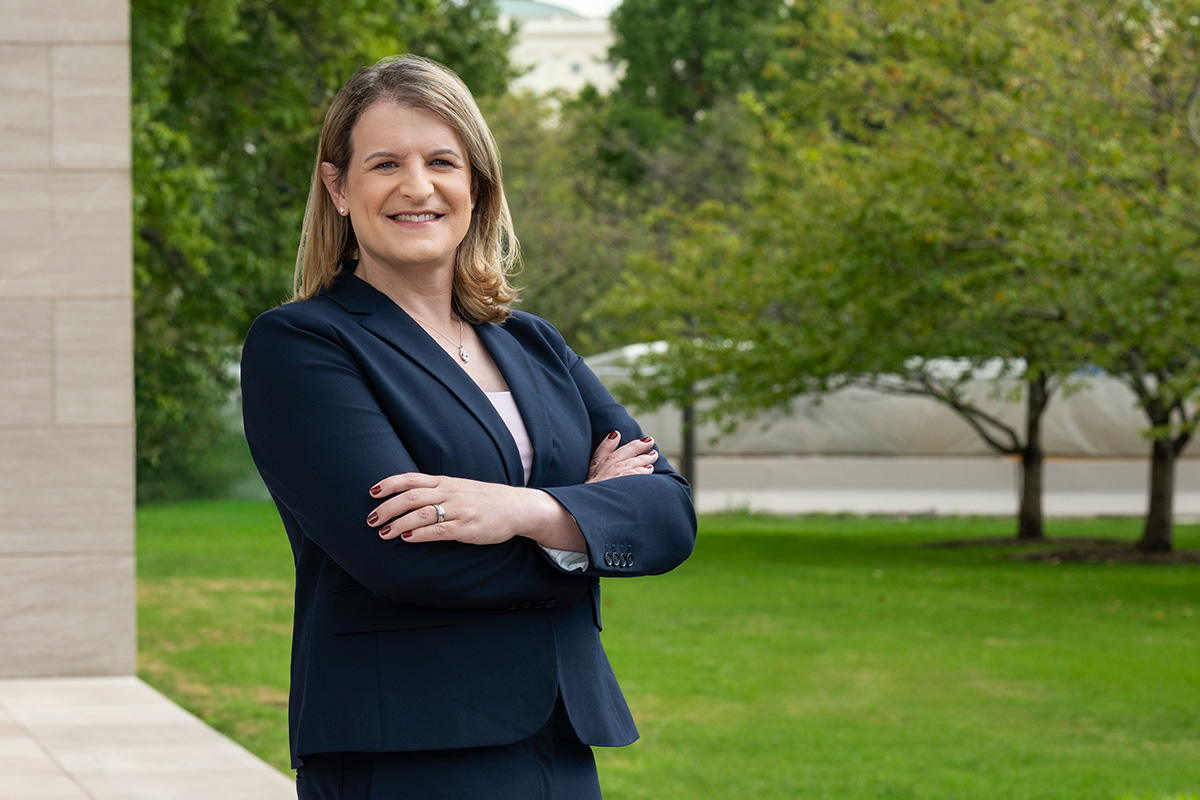
After being ousted from military service, Col. Bree Fram — once the highest-ranking openly transgender officer in the Pentagon — is now running for Congress.
Fram, who lives in Reston, Va., brings more than two decades of public service to her campaign. From the battlefield to the halls of the Pentagon, she spent more than 20 years working inside the federal government, often advocating for LGBTQ people and other marginalized communities from within the system.
Fram spoke with the Washington Blade about her decision to run amid sustained attacks against her — and against the LGBTQ community more broadly — from the Trump-Vance administration and far-right officials.
She said her commitment to public service began more than 22 years ago, shaped in large part by watching the Sept. 11, 2001, terrorist attacks.
“I had grown up expecting that there was this beautiful American peace stretching into the world for the foreseeable future, and that kind of image was shattered,” Fram told the Blade. “I realized that there was a continuous price to be paid to protect our democracy, to protect our freedoms. To be able to play a small part in defending those freedoms was incredibly important to me — to be part of something larger than myself.”

Commissioned through the U.S. Air Force Officer Training School in 2003, Fram served as an astronautical engineer and rose to the rank of colonel in the U.S. Air Force before later serving in the U.S. Space Force. She remained on active duty until 2025, when she was forced out following the Trump-Vance administration’s reinstated ban on trans military service.
Fram has been married for 20 years to her spouse, Peg Fram, and they have two children.
Beyond her military service, Fram has long been involved in advocacy and leadership. She has been a member of SPARTA, a trans military advocacy organization, since 2014, served on its board of directors beginning in 2018, and was president of the organization from 2021-2023.
Most recently, Fram served as chief of the Requirements Integration Division at Headquarters, Space Force, and as co-lead of the Joint Space Requirements Integration Cell in collaboration with the Joint Staff. Previously, she was chief of the Acquisition Policies and Processes Division for the assistant secretary of the Air Force for space acquisition and integration.
Earlier in her career, Fram served as a materiel leader at the Air Force Research Laboratory, overseeing the development of counter-small unmanned aerial systems and offensive cyberspace technologies in support of Pentagon and intelligence community priorities, managing an annual budget exceeding $100 million.
Her previous assignments also included oversight of Air Force security cooperation in four strategically significant Middle Eastern countries and 258 foreign military sales cases valued at $15.79 billion; serving as executive officer to the Air Force director of strategic plans, where she helped integrate the 30-year, $3.6 trillion Air Force Plan; a legislative fellowship on Capitol Hill with then-U.S. Del. Madeleine Bordallo (D-Guam), handling military, veterans, and foreign affairs issues; and a program management role at the National Reconnaissance Office, where she led a $700 million multi-agency engineering and IT contract overseeing more than 500 personnel and supporting $40 billion in assets.
Fram also directed 24/7 worldwide operations and maintenance of mission data processing for space-based and airborne national intelligence assets and co-led the Department of the Air Force’s LGBTQ+ Initiatives Team and Barrier Analysis Working Group from 2023-2025.
She holds a master’s degree from the Air Force Institute of Technology and is a distinguished graduate of the Naval War College. Fram deployed in support of Operation Iraqi Freedom, where she worked on airborne counter-improvised explosive device technologies.
In January, Fram, alongside four other trans military officers, was given a special retirement ceremony by the Human Rights Campaign — a direct result of President Donald Trump’s 2025 Executive Order 14183, titled “Prioritizing Military Excellence and Readiness.” The policy directed the Pentagon to adopt measures prohibiting trans, nonbinary, and gender-nonconforming people from serving in the military.
Under Virginia’s current congressional maps, Fram would challenge Congressman James Walkinshaw in a Democratic primary in the 11th Congressional District, which includes the city of Fairfax and most of Fairfax County. However, the district’s boundaries could change pending ongoing redistricting discussions in the state.
Fram emphasized that her decades working within the executive branch shaped her understanding of what it means to take — and uphold — an oath to the Constitution, even when those in power later forced her out of service solely because of her identity, not her performance.
“Through 23 years of service, I learned what it meant to fulfill that oath to the Constitution, and I wanted to continue serving,” she said. “But when this administration came in and labeled me and others like me ‘dishonorable’ and ‘disciplined liars who lack the humility required for military service,’ it hit hard. When the Supreme Court then agreed to let the administration fire all of us, I had to figure out what would allow me to continue my service in a way that was meaningful and lived up to that oath.”
After being told she would have to retire from a career she describes as her life’s calling, Fram said she began searching for another way to serve — a path that ultimately led her to run for Congress.
“I had done the work over the past couple of decades to understand the America that I believe in, that America I believe we all can be,” Fram said. “That’s where this decision came from. I believe I can fight back and fight forward for Virginians — with the knowledge I have and with a vision of the America we can be.”
That vision, she said, is one that has yet to be fully realized — despite decades of promises from Democratic leaders across all branches of government.
“This is about protecting our fundamental rights — freedom of speech, freedom to assemble, bodily autonomy, a woman’s right to choose, and the ability for queer people to live our best lives,” Fram said. “Right now, our government is throwing barriers up in front of many people. They’re strengthening them, building walls higher, and actively damaging lives.”

Fram said her leadership philosophy was shaped by watching strong, effective leaders during her time in the Air Force and Space Force — leaders who reinforced her belief that true leadership means expanding opportunity, not restricting it.
“Leadership is about tearing barriers down — not climbing over them and forcing others to suffer through the same things,” she said. “It’s about making sure the people coming up behind us have even more opportunity to go further, faster. How do we be better tomorrow than we are today? How do we fulfill our founding promise of life, liberty, and the pursuit of happiness?”
One way Fram said Congress could help dismantle those barriers is by passing the Equal Rights Amendment, enshrining constitutional protections for all people — particularly LGBTQ Americans.
“Getting the Equal Rights Amendment into the Constitution is absolutely critical to the future of queer rights,” she said. “Voting rights must also be clearly protected.”
Protecting democracy itself is also among her top priorities, Fram said.
“We need to take control of the House so we can put real checks on this administration,” she said. “That allows the American people to see how this administration is actively making their lives worse and less affordable — and it’s how we ultimately throw them out and get back to making life better.”
Fram said her experience working under four presidents — including during Trump’s first term — reinforced her belief that opposition to efforts curtailing civil liberties is essential.
“The primary thing we can do to protect democracy is to get rid of this administration,” she said. “Taking control of the House gives us true investigative power. Under every rock, there is likely an impeachable offense because they are failing to faithfully execute the laws of the United States.”
For her, the message Trump is sending is clear — he and others close-minded to the LGBTQ community are threatened by the possibility of what someone truly dedicated to service can become.
“One of the reasons this administration had to throw us out and silence us was because we were an example of what was possible. We shined so brightly by meeting or exceeding every standard that they couldn’t hide us away by any other means except kicking us out.”
Fram acknowledged that her identity has been a political target since 2016, but said those attacks have never been grounded in her ability to lead or accomplish complex missions over more than two decades of service.
“If others want to attack me on my identity, I welcome it,” she said. “I’m focused on whether people can afford groceries or feel safe in their communities.”
“I’m happy to be a lightning rod for those kinds of attacks,” she added. “If it allows Democrats to advance an agenda that makes life better for Americans, they can come after me all day long. They attacked me while I was in the military, before I was ever running for office.”
On policy, Fram said affordability, health care, and safety are at the center of her agenda.
“No one should be afraid to go to the doctor or fear surprise medical bills that put them into debt,” she said. “Every American deserves access to affordable, high-quality health care.”
She also emphasized a willingness to work across party lines — even with those who previously politicized her identity — if it means delivering results for constituents.
“If someone wants to work together to make people’s lives better, I’ll work with them,” she said. “If they want to come after me based on who I am, they can waste their energy on that.”
Asked how she defines hope in the current political moment, Fram rejected the idea of passive optimism.
“Hope isn’t naive optimism,” she said. “Hope is doing the work — engaging people and bending the moral arc of the universe toward justice.”
She added that representation itself can be transformative.
“Just being in Congress changes the narrative,” Fram said. “It lets a kid say, ‘Oh my God — I could do that too.’”
District of Columbia
Eleanor Holmes Norton ends 2026 reelection campaign
Longtime LGBTQ rights supporter introduced, backed LGBTQ-supportive legislation
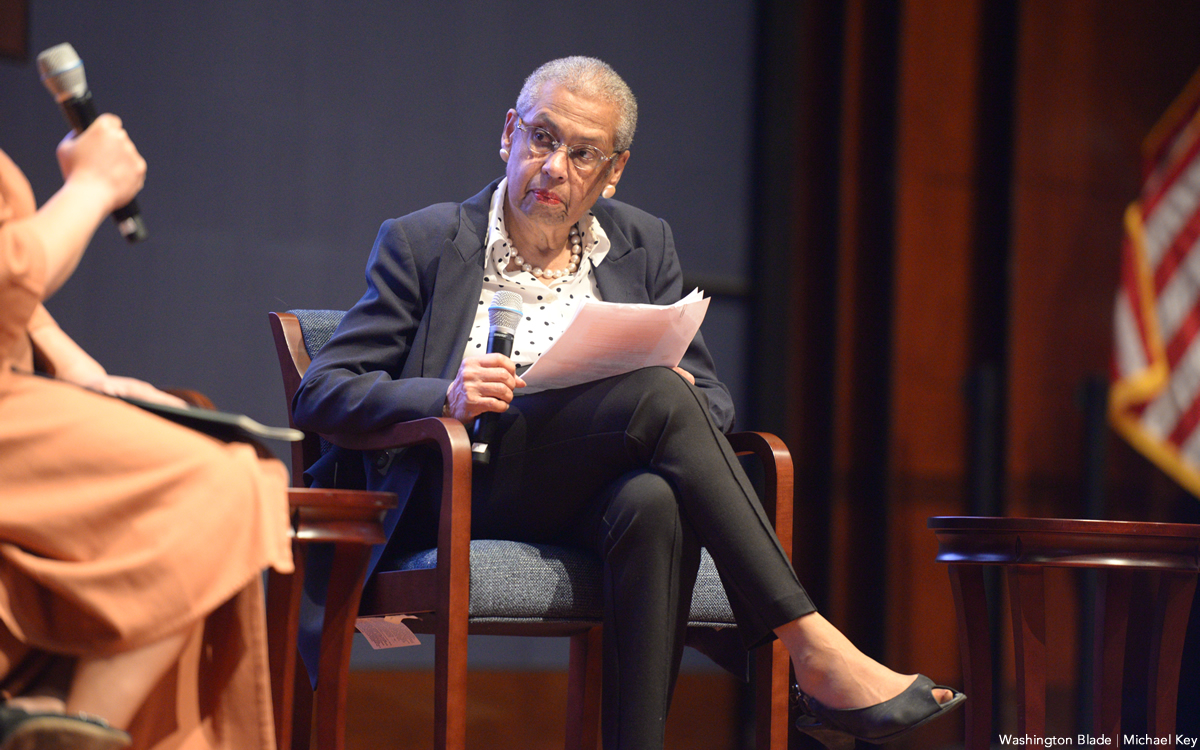
The reelection campaign for D.C. Congressional Delegate Eleanor Holmes Norton, who has been an outspoken supporter of LGBTQ rights since first taking office in 1991, filed a termination report on Jan. 25 with the Federal Elections Commission, indicating she will not run for a 19th term in the U.S. House of Representatives.
Norton’s decision not to run again, which was first reported by the online news publication NOTUS, comes at a time when many of her longtime supporters questioned her ability to continue in office at the age of 88.
NOTUS cited local political observers who pointed out that Norton has in the past year or two curtailed public appearances and, according to critics, has not taken sufficient action to oppose efforts by the Trump-Vance administration and Republican members of Congress to curtail D.C.’s limited home rule government.
Those same critics, however, have praised Norton for her 35-year tenure as the city’s non-voting delegate in the House and as a champion for a wide range of issues of interest to D.C. LGBTQ rights advocates have also praised her longstanding support for LGBTQ rights issues both locally and nationally.
D.C. gay Democratic Party activist Cartwright Moore, who has worked on Norton’s congressional staff from the time she first took office in 1991 until his retirement in 2021, points out that Norton’s role as a staunch LGBTQ ally dates back to the 1970s when she served as head of the New York City Commission on Human Rights.
“The congresswoman is a great person,” Moore told the Washington Blade in recounting his 30 years working on her staff, most recently as senior case worker dealing with local constituent issues.
Norton has been among the lead co-sponsors and outspoken supporters of LGBTQ rights legislation introduced in Congress since first taking office, including the currently pending Equality Act, which would ban employment discrimination based on sexual orientation and gender identity.
She has introduced multiple LGBTQ supportive bills, including her most recent bill introduced in June 2025, the District of Columbia Local Juror Non-Discrimination Act, which would ban D.C. residents from being disqualified from jury service in D.C. Superior Court based on their sexual orientation or gender identity.
For many years, Norton has marched in the city’s annual Pride parade.
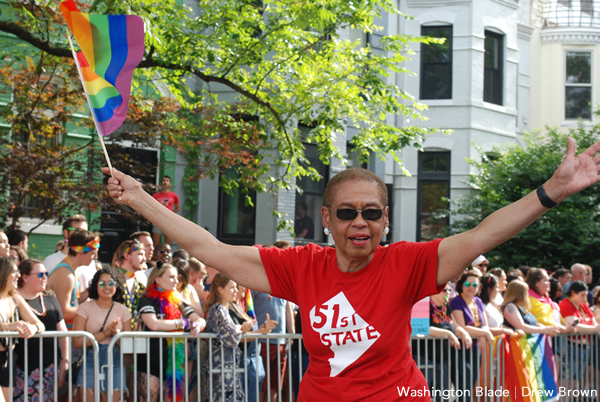
Her decision not to run for another term in office also comes at a time when, for the first time in many years, several prominent candidates emerged to run against her in the June 2026 D.C. Democratic primary. Among them are D.C. Council members Robert White (D-At-Large) and Brooke Pinto (D-Ward 2).
Others who have announced their candidacy for Norton’s seat include Jacque Patterson, president of the D.C. State Board of Education; Kinney Zalesne, a local Democratic party activist; and Trent Holbrook, who until recently served as Norton’s senior legislative counsel.
“For more than three decades, Congresswoman Norton has been Washington, D.C.’s steadfast warrior on Capitol Hill, a relentless advocate for our city’s right to self-determination, full democracy, and statehood,” said Oye Owolewa, the city’s elected U.S. shadow representative in a statement. “At every pivotal moment, she has stood firm on behalf of D.C. residents, never wavering in her pursuit of justice, equity, and meaningful representation for a city too often denied its rightful voice,” he said.
A spokesperson for Norton’s soon-to-close re-election campaign couldn’t immediately be reached for a comment by Norton on her decision not to seek another term in office.
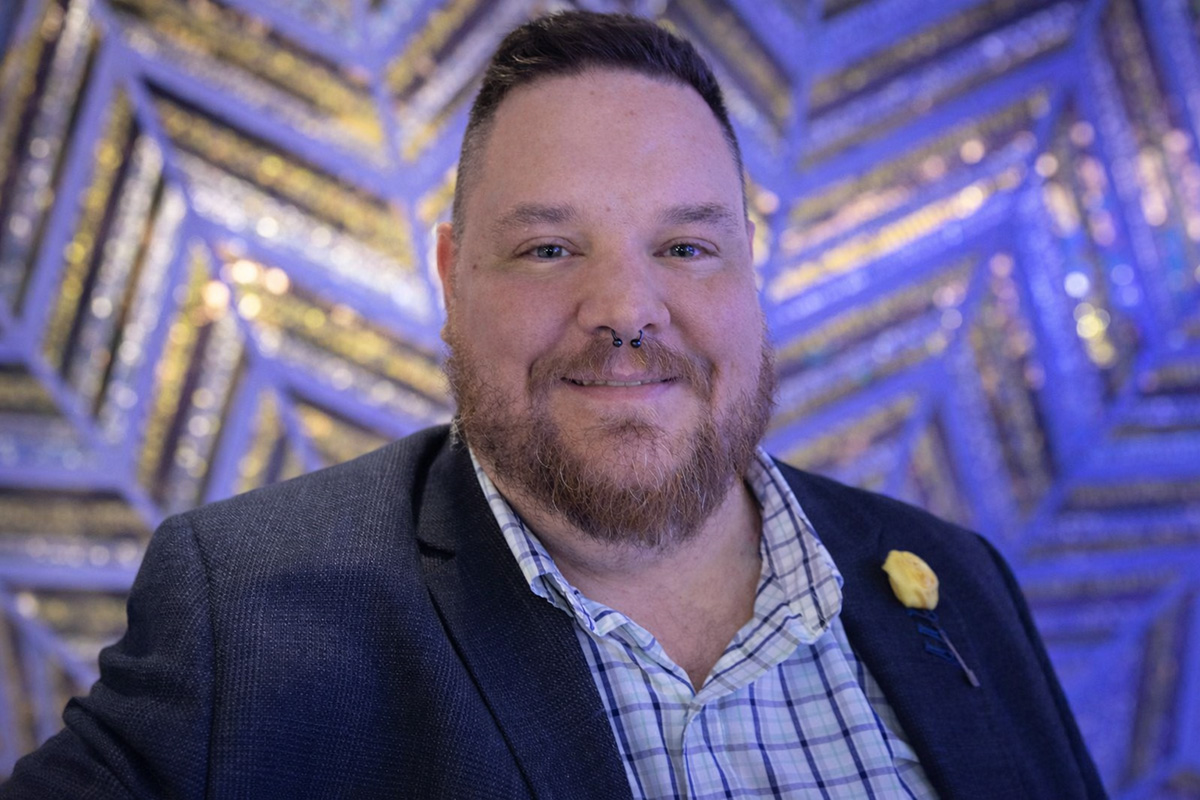
The Comings & Goings column is about sharing the professional successes of our community. We want to recognize those landing new jobs, new clients for their business, joining boards of organizations and other achievements. Please share your successes with us at [email protected].
The Comings & Goings column also invites LGBTQ+ college students to share their successes with us. If you have been elected to a student government position, gotten an exciting internship, or are graduating and beginning your career with a great job, let us know so we can share your success.
Congratulations to R. Warren Gill III, M.Div., M.A. on being appointed as the development manager at HIPS. Upon his appointment, Gill said, “For as long as I’ve lived in Washington, D.C., I’ve followed and admired the life-saving work HIPS does in our communities. I’m proud to join the staff and help strengthen the financial support that sustains this work.”
Gill will lead fundraising strategy, donor engagement, and institutional partnerships. HIPS promotes the health, rights, and dignity of individuals and communities impacted by sexual exchange and/or drug use due to choice, coercion, or circumstance. HIPS provides compassionate harm reduction services, advocacy, and community engagement that is respectful, non-judgmental, and affirms and honors individual power and agency.
Gill has built a career at the intersection of progressive politics, advocacy, and nonprofit leadership. Previously he served as director of communications at AIDS United, supporting national efforts to end the HIV epidemic. Prior to that he had roles including; being press secretary for Sen. Bernie Sanders during the 2016 presidential primary, and working with the General Board of Church and Society, the United Methodist Church, the denomination’s social justice and advocacy arm.
Gill earned his bachelor’s degree in philosophy and religious studies, Jewish Studies, Stockton University; his master’s degree in political communication from American University, where his graduate research focused on values-based messaging and cognitive linguistics; and his master of Divinity degree from the Pacific School of Religion.
-

 District of Columbia5 days ago
District of Columbia5 days agoJudge denies D.C. request to dismiss gay police captain’s anti-bias lawsuit
-

 Minnesota5 days ago
Minnesota5 days agoLawyer representing Renee Good’s family speaks out
-

 Local5 days ago
Local5 days agoComings & Goings
-

 Federal Government4 days ago
Federal Government4 days agoTrump-appointed EEOC leadership rescinds LGBTQ worker guidance
















